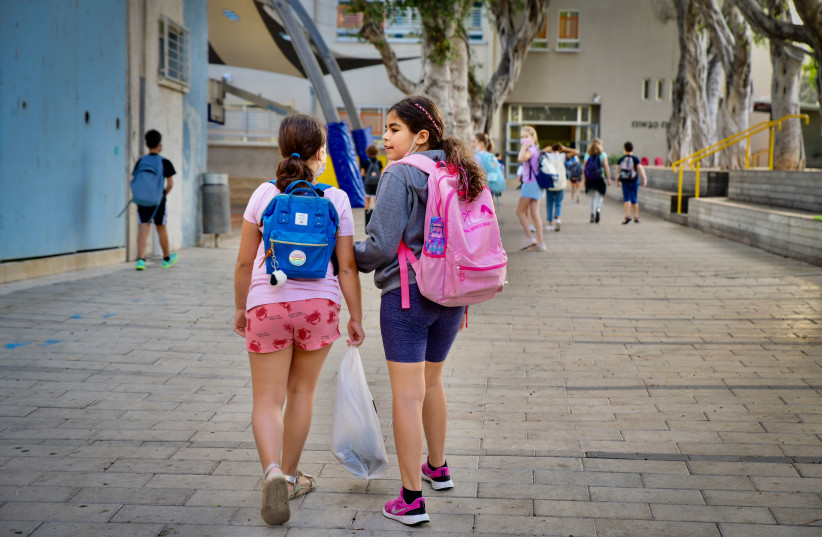Sunday marked the beginning of the first full working week in over a month, after the period of Jewish holidays. Israeli children were back in classrooms and adults to their normal schedule, without facing repeated off days in the middle of the week.
The new beginning also marked a fresh start on seeing how the country is dealing with the corona pandemic.
The past few days have shown increasingly encouraging data, prompting health officials to express optimism just days after they had sounded the alarm about a new increase in serious patients and the overload on Israeli hospitals.
The upcoming week or two will be crucial in understanding where the country is really headed, by looking at the change in data as the number of daily tests performed becomes more consistent. Even more so, officials will be able to see how the full reopening of schools is affecting trends, as several experts said.
“Several elements are very encouraging,” said Prof. Cyrille Cohen, head of the immunotherapy laboratory at Bar-Ilan University. “The positivity rate has been steadily decreasing for a few weeks – it stood at 6%-7% and now is down to around 2.7%,” referring to the percentage of corona tests returning a positive result, which, as he noted, “is less influenced by the number of tests, contrary to what happens with the daily cases themselves.”
The number of tests performed every day in the second half of August and the very beginning of September was consistently around 150,000. After the holiday period began, it fluctuated between 55,000 and 185,000, with as little as 2,400 to more than 10,000 people infected.
On Saturday, however, only 1,709 new cases were identified according to the Sunday report by the Health Ministry, marking the lowest number since the end of July.
“The figure of patients in serious conditions, which is even more objective, is also declining,” said Cohen. “We were at over 700 and now we are at 580. The daily number of people developing serious symptoms is going down as well.”
“The situation is complex but we can see that the trend is undoubtedly improving,” said Prof. Nadav Davidovitch, director of Ben-Gurion University of the Negev’s School of Public Health, an epidemiologist and a member of the expert committee advising the ministry on the crisis.
Davidovitch also emphasized that the R, or reproduction rate, has been dropping, currently standing at 0.74.
Davidovitch explained that several other elements besides the number of daily cases are taken into account to calculate it, therefore it can be considered a reliable sign that morbidity is declining.
“At the Sheba Medical Center, we are definitely seeing a reduction in hospitalizations and in severe patients,” said Prof. Eyal Leshem, director of Sheba’s Center for Travel Medicine and Tropical Diseases. “I would also add that nearly all people hospitalized are not vaccinated.”
The three experts said that no doubt remains about the efficacy of the third shot in curbing morbidity and serious infections.
“We now can say for sure that the booster represents a very important factor,” Davidovitch said. “The main challenge is to convince people, especially young people and members of the Arab community, to get vaccinated. We now see clearly that the vaccine covers the Delta variant as well as it did with previous variants, and that the main problem has been the waning of immunity after a certain period of time.”

DAVIDOVITCH, Cohen and Leshem said that the upcoming days will be critical, especially in monitoring how the full reopening of the education system will impact the situation and whether it will lead to an increase in daily cases, which Leshem said “is possible.”
“If we look at current data, we can see that in the past month, about a third of the infections have occurred among children age 0-9, and around 53%-55% of the cases were registered among people 0-19,” Cohen said.
“I’m not overly concerned because these populations usually are not at risk. But on the other hand, a high number of cases could create a rise in pediatric patients. It is a possibility. I think we need two more weeks to assess what the impact of schools will be.”
Davidovitch said he believes “cases will increase but not in a dramatic way,” and that the lower level of morbidity compared with the beginning of the school year on September 1 will probably help limit infections.
“In the coming weeks, I also hope that vaccination for children age 5-11 will be authorized,” he said.
Leshem also said that inoculation for this cohort will be a very important tool against the virus.
Asked whether it is possible to say that Israel is really leaving the fourth wave behind, Leshem said that “looking at the data objectively, we do see a decline. It is not about an interpretation.”
Cohen said that there is cause for optimism, “but I want to be cautious. It is true that the holidays cause many gatherings among families or in synagogues, but on the other hand, this period represents a sort of voluntary lockdown, when children often don’t go to school and parents don’t go to work. The real test is coming now.”
If the positive trends would be confirmed, would it mean that the government’s strategy paid off, and Israel managed to leave the new wave behind without any major restrictions?
“It is a little complicated,” Cohen said. “On the one hand, I don’t believe in lockdowns as a solution. On the other, I think we should ask ourselves whether we could have done better. Let us not forget that around 1,300 people lost their lives to the virus between August and September. Maybe with just minimal further measures, such as a limit on the largest gatherings or better enforcement, we could have had a better outcome without a major impact on the economy.”
